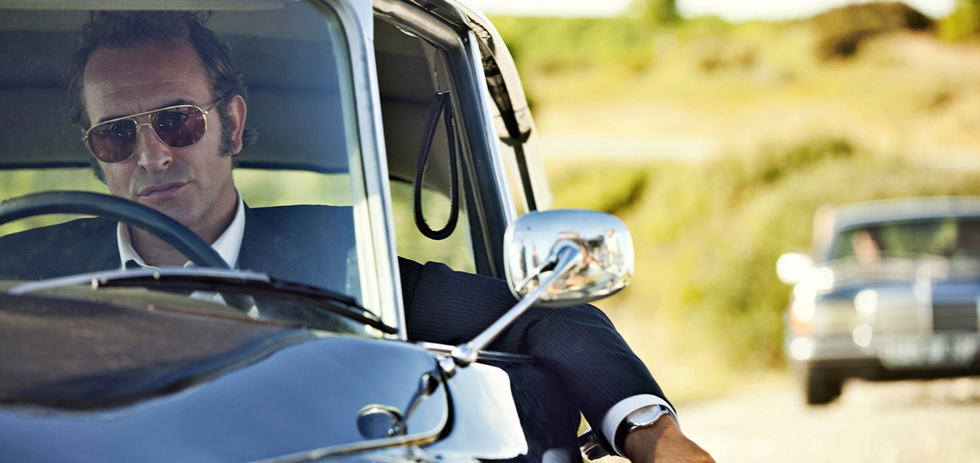
The Connection (La French) follows the magistrate and police squad in Marseilles who sought to take down the ‘French Connection’ drug trafficking operation in the early 1970s. The Connection‘s existence seems marketed as a filmic corrective; William Friedkin’s The French Connection is seemingly the definitive take on the subject matter yet it completely sidelines the involvement of international police in France and Turkey, pinning much of the operation’s unravelling on two American cops. There are a few clear visual references to Friedkin’s film throughout, most notably the first time a character explains the operation and we cut to a car being lifted onto a barge, drugs hidden within its frame. For the most part, though, the film is more concerned with telling its own story, complete with its own heroes and villains.
For Western audiences, Jean Dujardin is his own cinematic figure — he is OSS 117, he is The Artist — which is why him playing a virtuous magistrate in the world of organised crime rings false from the opening scene. Where Scorsese was able to get a hilarious supporting performance from him in The Wolf of Wall Street, essentially playing off of the perceived persona of a foreign film star, here Jiminez does so little; Dujardin is window-dressing in his own movie, a face attached to a cardboard cutout of the atypical talented investigator, novelty through some seedy muttonchops. At one point a suspect asks him if he’s memorised all of his files, then asks Dujardin if he knows the man’s birthdate, only to have a quick and accurate answer. In other sequence, we see him gloomily staring off into the distance after some marital issues. It’s just lazy character development that merely plays off of existing tropes. Dujardin is at his most engaging when he gleefully plays the system, as in one scene where he manages to get a suspect’s fingerprints on a gun by tossing it at him. Outside of that, though, it’s a disappointingly plain turn.
It doesn’t help matters that his target, drug king Tany Zampa, is played by Gilles Lellouche, who happens to look like Jean Dujardin (perhaps with a dash of Vincent Lindon). There’s a recurring visual link between the police and the gangsters as well, separate celebration scenes are mirrored, Zamba and Pierre Michel playing with their children one of the more egregious, the act of investigating and the act of ‘cooking’ are likewise made parallel. Whilst Lellouche is doing something slightly more interesting than Durjardin, he’s still held up by the lazy script. He gets violent when anyone questions his authority, his relationship with his son and the idea of ‘becoming a man’ is completely underdeveloped.
Running at over two hours you’d expect the reason for the bloat has got to do with packing in facts and character from the headlines. Unfortunately though, what we have are just the usual scenes of ‘gangster’ cinema – the introduction of families, false reveals as to the placement of heroin labs, the innocents who die treated as plot points and not real people. There’s a spate of killings in the middle of the film, scenes in which we’re not entirely sure who has the authority to do what, or why. A major turn in the film’s final act is handled so poorly (i.e. one character ‘knows’ something bad has happened, apropos of nothing) as to render its emotional import totally hollow. It’s as if Jimenez shoots with a hazy memory of what he’s aping, vague narrative beats couched between sloppy montage.
The best piece of era re-creation in the entire film is the Gaumont logo at the beginning; sadly what follows is a fairly plain historical thriller that isn’t able to conjure interest even by throwing poppy songs and montage sequences in (the latter is one of the film’s biggest flaws). Some of the music choices were cringeworthy in the way Jiminez seems to have mined older films for their music. Dropping in Blondie’s “Call Me” (American Gigolo), Sheila’s “Bang Bang” (though not the Dalida cover, Xavier Dolan owns this song) and, inexplicably, Max Richter’s “This Bitter Earth / On the Nature of Daylight” from Shutter Island just emphasises the recycled nature of The Connection.
The editing alone undercuts any chance of an impressive self-contained scene. When Zampa and Pierre Michel have a terse conversation on an empty road with a beautiful view of the sea, it’s cut with a line-by-line shot reverse shot with no regard for rhythm; the artifice of it all is so clear, more concerned with the view than the dialogue, a world away from the cop/criminal exchange in Mann’s Heat. There’s a montage sequence of the heroin going to New York that is stunningly terrible, poorly edited, clearly shot elsewhere (thus making it placeless) and with a ‘New York’ obviously just green-screened in in the windows of a taxi and a bedroom.
The issue isn’t that The Connection is unwatchable or particularly tedious, it’s that the film is so run-of-the-mill, a TV movie someone mistook for cinema worthy. As a result, not only does The Connection fail to provide a compelling justification for this French perspective on The French Connection, it also fails as an engaging period-set film, or even an interesting crime story.
